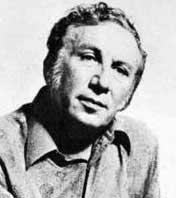Nizar Qabbani
| Nizar Qabbani | |
|---|---|
 |
|
| Native name | نزار قباني |
| Born |
21 March 1923 Damascus, State of Damascus, French Mandate for Syria and the Lebanon |
| Died | 30 April 1998 (aged 75) London, England |
| Occupation | Diplomat, poet, writer, publisher |
| Nationality | Syrian |
| Website | |
| nizarq |
|
Nizar Tawfiq Qabbani (Arabic: نزار توفيق قباني, Nizār Tawfīq Qabbānī) (21 March 1923 – 30 April 1998) was a Syrian diplomat, poet and publisher. His poetic style combines simplicity and elegance in exploring themes of love, eroticism, feminism, religion, and Arab nationalism. Qabbani is one of the most revered contemporary poets in the Arab world.
Nizar Qabbani was born in the Syrian capital of Damascus to a middle class merchant family. Qabbani was raised in Mi'thnah Al-Shahm, one of the neighborhoods of Old Damascus. Qabbani studied at the national Scientific College School in Damascus between 1930 and 1941. The school was owned and run by his father's friend, Ahmad Munif al-Aidi. He later studied law at the Damascus University, which was called Syrian University until 1958. He graduated with a bachelor's degree in law in 1945.
While a student in college he wrote his first collection of poems entitled The Brunette Told Me. It was a collection of romantic verses that made several startling references to a woman's body, sending shock waves throughout the conservative society in Damascus. To make it more acceptable, Qabbani showed it to Munir al-Ajlani, the minister of education who was also a friend of his father and a leading nationalist leader in Syria. Ajlani liked the poems and endorsed them by writing the preface for Nizar's first book.
After graduating from law school, Qabbani worked for the Syrian Foreign Ministry, serving as Consul or cultural attaché in several capital cities, including Beirut, Cairo, Istanbul, Madrid, and London. In 1959, when the United Arab Republic was formed, Qabbani was appointed Vice-Secretary of the UAR for its embassies in China. He wrote extensively during these years and his poems from China were some of his finest. He continued to work in the diplomatic field until he tendered his resignation in 1966. By that time, he had established a publishing house in Beirut, which carried his name ().
...
Wikipedia
